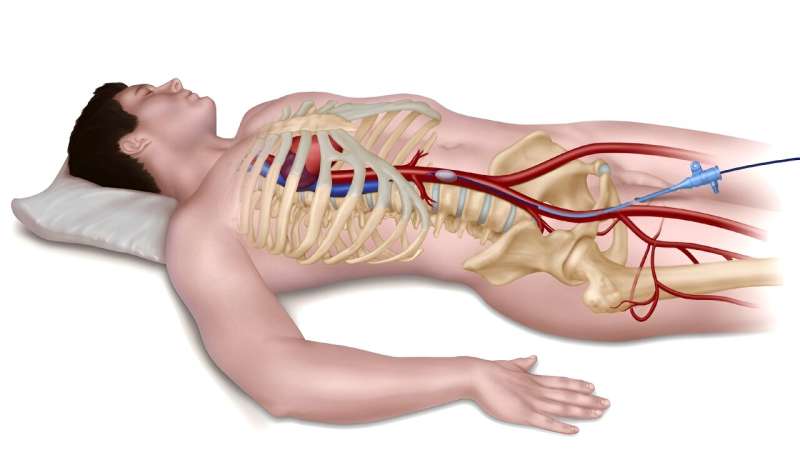This article has been reviewed according to Science X's editorial process and policies. Editors have highlighted the following attributes while ensuring the content's credibility:
fact-checked
peer-reviewed publication
trusted source
proofread
New treatment for severe bleeding after injury does not show benefit in clinical trial

A new technique used to control severe bleeding in injured patients has been found to likely increase the risk of death, according to new research from the University of Aberdeen.
The world's first clinical trial of resuscitative endovascular balloon occlusion of the aorta (REBOA) found that patients treated with REBOA were more likely to die than those who did not undergo REBOA.
REBOA was being considered for greater use in the NHS and the University of Aberdeen research team had been conducting research to determine whether it was beneficial or not.
REBOA can be used to control bleeding from serious injuries—such as those seen in car crash victims or people who have fallen from height—and involves temporarily stopping the blood flow to the lower part of the body until patients can be taken to an operating theater.
Life-threatening bleeding in the abdomen or chest usually requires an operation to stop it and people with such injuries can sometimes bleed to death in the emergency department before they can reach an operating theater.
REBOA is a technique whereby a small balloon is introduced through the femoral artery in the groin and then inflated inside the aorta (the body's main blood vessel). Although first attempted in 1954 the procedure has been refined and developed over the past decade and dedicated REBOA devices are now offered by several companies.
The aim is to limit blood loss and redirect the remaining blood to the brain and heart. The technique is intended to "buy time," alongside other life-saving interventions, until the patient can be taken to an operating theater and the bleeding can be stopped for good.
The study, published in the Journal of the American Medical Association (JAMA ), took place in 16 major trauma centers in the UK, where 90 adult trauma patients took part, and were randomly selected to receive standard care or standard care and REBOA.
Unexpectedly, the trial showed that the use of REBOA increased the risk of death rather than reduce it. In the standard care group 42% of patients died within 90 days of their injury compared to 54% of participants (12% more) in the standard care plus REBOA group.
Jan Jansen, previously a surgeon and honorary senior clinical lecturer at the University of Aberdeen and now professor of surgery at the University of Alabama at Birmingham, U.S., was the co-chief investigator of the study.
"Bleeding is the most common cause of preventable death after injury," he said. "It was hoped that REBOA, when used in the emergency department, would reduce the risk of bleeding to death but our study found the opposite. This may be because REBOA is a challenging and complex procedure to perform, especially in patients who are at imminent risk of dying. The trial clearly did not show the expected benefits but is incredibly important because it will prompt clinicians and trauma centers to re-evaluate whether they should be using REBOA."
Professor Marion Campbell, Professor of Health Services Research at the University of Aberdeen and co-chief investigator, added, "While the clinical trial did not show the anticipated benefits it shows how important it is to ensure that all new treatments being considered for use in the NHS are rigorously tested."
More information: Jan O. Jansen et al, Emergency Department Resuscitative Endovascular Balloon Occlusion of the Aorta in Trauma Patients With Exsanguinating Hemorrhage, JAMA (2023). DOI: 10.1001/jama.2023.20850



















